Whether in working on spatial planning-oriented concepts for urban development, in developing strategies for a careful urban renewal, in teaching large- to small-spatially scaled mobility concepts or in synthesizing energetic innovation and well-known urban furnishing – all the teaching offers invite to a bundled meeting with the three themes of sustainable development: „Nature“, „Culture and Cultural Heritage“and „Society“. The range of modules reaches from teaching urban design via electives and impromptu designs towards research areas, partially completed by excursions and field studies. The rural and the urbane space are herewith always objects of research and equally Laboratory of real conditions.
The UNESCO Chair contributes actively within the teaching obligations of the Transit-Chair at the Faculty of Architecture, RWTH Aachen. Each semester will be dedicated to cultural political questions in at least two teaching courses in the educational programs Bachelor of Architecture and Master of Architecture as well as in the master course Urban Planning and in the English-taught master course Transforming City Regions.

The UCCU-Modules in the educational program of the International Master Program Transforming City Regions, opened in 2019, represent a special building stone. They serve to further profile the educational program substantially and equally approach global standards as well as thematic caesuras.
An overview about current offers of teaching will be provided here.
World Heritage stands as one of the highest categories recognised by the United Nations for the protection and conservation of the Earth’s heritage. World Heritage is perfectly integrated in other international documents of the United Nations, such as the objectives of the 2030 Agenda or those of the New Urban Agenda Habitat III. It stands out in section 11, contributing to the formation of sustainable cities (ICCROM, 2011), while in the Agenda approved in Quito, World Heritage is framed in the areas of resilient cities and sustainable cities. The precepts of the 1994 Nara Charter and the 2020 Leipzig Charter have also been considered in new urban policies. In this framework, World Heritage is a key element in urban development at the international level.
The urban development of European cities is linked to the emergence of monasteries. During the Middle Ages, religious orders spread occupying not only the territory, but especially the city. In central Europe, in what is now Germany, monasteries developed significantly. Cities such as Cologne or Aachen had more than 60 and 30 monastic buildings, respectively. Aachen stands out as not only the second monastery town in North Rhine-Westphalia but also as other important facts. It was the capital of the Carolingian Empire, one of the points on the Pilgrim’s Way to Santiago de Compostela, and later as a border town of the Holy Roman Empire. The monasteries in the city are not only religious facilities, but also educational, health and even inns. The centrality of Aachen, together with the general lack of a public school, hospital, or hospice system, meant that these functions were taken over by the religious orders in the monastic buildings. Monasteries and convents are not only a reflection of urban importance, but also mark future urban growth. The city of Aachen is shown to be a remarkable example of monastic development in the European city.
Dr. Javier Ostos Prieto

The Zollverein World Heritage Site, located in the north of the city of Essen, is an industrial complex that covers around 100 hectares and represents the history of coal mining and the steel industry in the Ruhr region. Declared a UNESCO World Heritage Site in 2001, Zollverein is known for its modern and functionalist architecture, which was mainly designed by the architect Fritz Schupp and the engineer Martin Kremmer
When it opened in 1932, this site was one of the largest and most efficient coal mines in the world. Its design includes iconic elements such as the blast furnace and conveyor systems. Today, Zollverein is not only a symbol of Germany’s industrial past, but also a vibrant cultural centre that hosts museums, galleries and artistic events. It has also become a major tourist destination, attracting more than 1 million visitors a year who can explore its impressive history and enjoy a variety of cultural activities.
Housing is one of the central basic human needs. However, this need is often not adequately met. The reasons for this are varied and complex; they range from housing offers that do not adequately address the needs of contemporary and future housing to ecological and economic requirements.
In addition, housing plays a key role in urban development and must respond to changing demographic, economic and ecological conditions. The ‘classic’ floor plans, which are often orientated towards a family model, are no longer in line with the changed framework conditions and demands.
Under the title ‘Unusual living’, we want to pursue two objectives against this background:
-Test the extent to which the Zollverein UNESCO World Heritage Site is suitable for living in general.
-To show what unusual ideas for future living might look like.
Prof. Christa Reicher, Prof. Anne Klasen-Habeney, Stefan Krapp, Dr. Javier Ostos Prieto, Alper Al

World Heritage stands as one of the highest categories recognised by the United Nations for the protection and conservation of the Earth’s heritage. World Heritage is perfectly integrated in other international documents of the United Nations, such as the objectives of the 2030 Agenda or those of the New Urban Agenda Habitat III. It stands out in section 11, contributing to the formation of sustainable cities (ICCROM, 2011), while in the Agenda approved in Quito, World Heritage is framed in the areas of resilient cities and sustainable cities. The precepts of the 1994 Nara Charter and the 2020 Leipzig Charter have also been considered in new urban policies. In this framework, World Heritage is a key element in urban development at the international level.
Buffer Zones are intended as areas to preserve the heritage values of the building. In many cases this area generates quite restrictive situations for urban transformation through special legislation, thus limiting the increase of urban density, occupation, number of floors, building uses, aesthetics of facades and roofs, among others. This dynamic generates a new urban tension, constraining the city’s development and often sparking debates between preserving historical elements and embracing modernisation. In this course we will work on the preservation of UNESCO cities. They represent paradigmatic examples in the management of the urban planning carried out due to their World Heritage status.

UNESCO World Heritage status in urban areas has helped the preservation of the historic city. However, there is an expectation that city growth has predominantly occurred on the surroundings rather than in central areas, constrained by heritage protection laws. In the case of Aachen, the incorporation of BufferZones into urban planning has restricted architectural interventions in the city center and modifications of land use on existing plots.This phenomenon can sometimes be favourable, as in the case of Seville, where the visual pollution of the Cathedral Bufferzone was greatly reduced. But it was also negative, leading to an excessive increase in tourism, displacing the local population to the urban periphery and leaving the historic centre totally depopulated.
The creation of guidelines and strategies at the urban level is foreseen to help balance heritage protection, urban development and sustainable energy promotion. To this end, it is expected to create urban plans for cities and UNESCO itself that can serve as a support for the definition of Buffer zones and protections in urban areas. This new instrument will help governmental institutions at national and local level to improve city management. Linking World Heritage and urban development is the key to achieving a resilient and sustainable city supported by the objectives of the Urban Agendas.

The villages in Belice Valley, near Palermo, were devastated by an unexpected earthquake in 1968, leading to significant questions about handling urban destruction and preserving cultural heritage. In response, new villages were built within an early postmodern style, featuring oversized roads and artist-designed utopias, which now stand largely abandoned, evoking dystopian imagery. The original Gibellina was encased in concrete as a permanent art piece, while the untouched ruins of Poggioreale Antica contrast as a testament to the ongoing dialogue between culture and nature. Current social science theories, influenced by deindustrialization, suggest that not all ruins necessarily merit preservation as cultural heritage, especially in an era of ecological and resource constraints. This bachelor thesis focusing on Poggioreale Antica aims to transform the space into a hopeful memorial, balancing cultural values, economic needs, and community identity while avoiding the imposition of external utopias, as was done in the past.
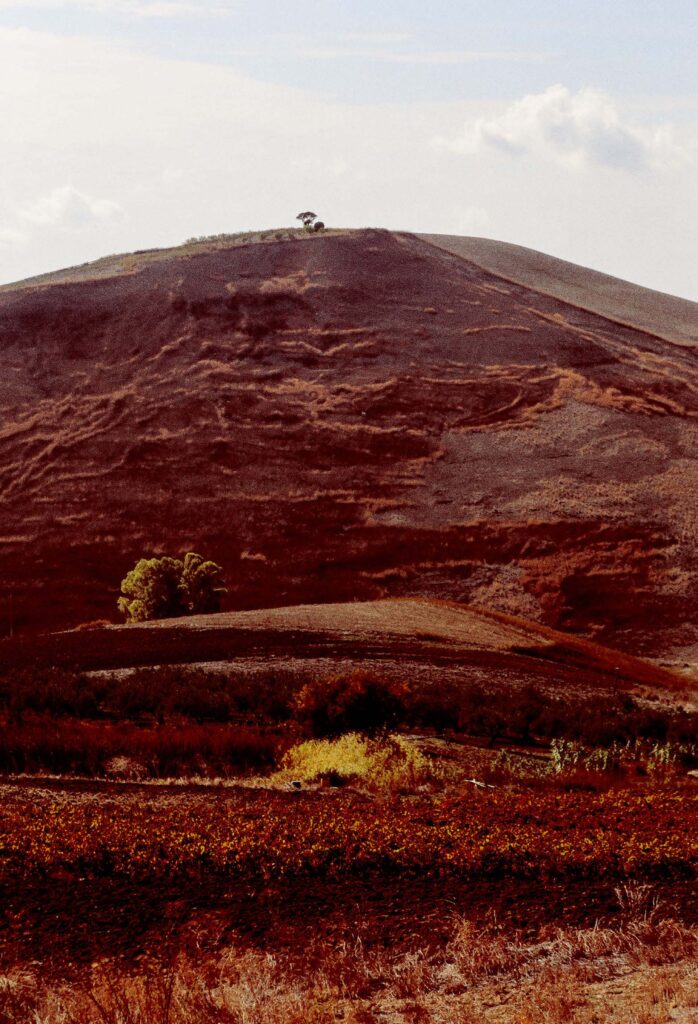
Heatwave summers and heavy rainfall events as consequences of climate change are also becoming more frequent in Europe and are a serious threat to historic city districts. Therefore, old towns should not rely on the surrounding buildings but also make their contribution to climate protection. Even though only 3-4% of the total building stock in Germany is listed, these areas in cities are often concentrated in entire neighbourhoods and also affect the retrofittability of neighbouring buildings.
Solar energy is an important piece of the puzzle to mitigate climate change. So that the expansion of solar energy does not stop at entire city districts, just because the protection of historical monuments is not always positive towards the expansion of photovoltaic systems, as also in Aachen: “Monument authority hinders solar expansion” (Aachener Zeitung, 20.10.2022).
Of course, it is still important to protect the architectural heritage as much as possible and still find ways to reconcile the protection of historical monuments and climate protection. Instead of categorically rejecting the expansion, consensual solutions should be sought. Examples of how this can succeed already exist in numerous cities in Germany and Europe. So far, however, most solutions are characterized by the idea of hiding photovoltaic systems, which is of course one possibility, but there must be another way! Why do we accept big shop windows and neon signs on the first floor, but nobody wants to see solar panels on the roof?
The students developed some design proposals and guidelines for Aachen’s historical centre, which is located in the UNESCO buffer zone, to get to the bottom of the question of acceptance.
For direct practical relevance, this research field was carried out in cooperation with the monument preservation department of the city of Aachen.
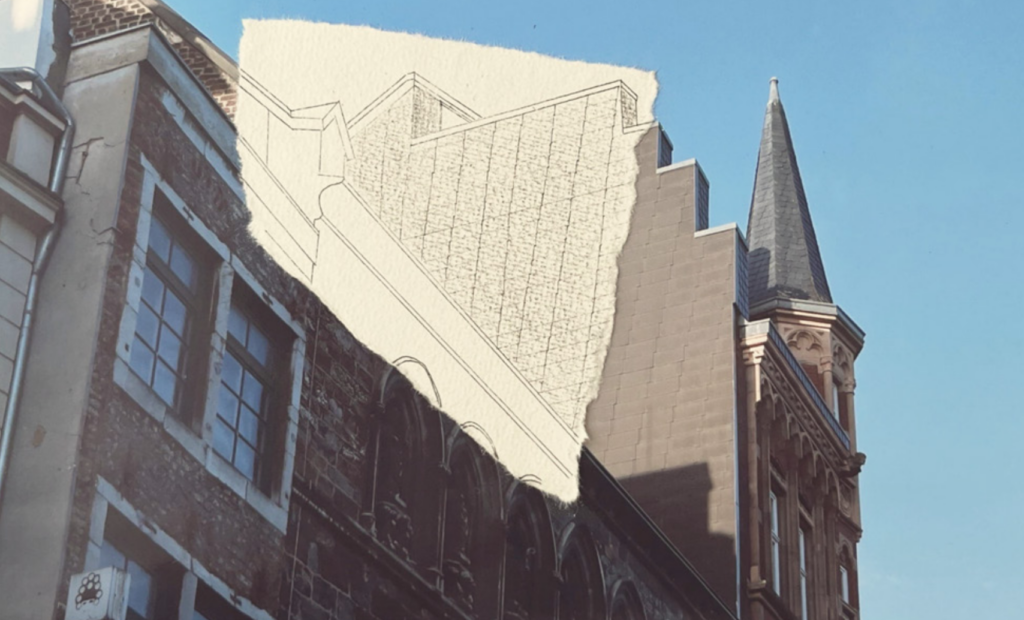
The host chair of the UNESCO Chair for Cultural Heritage and Urbanism offers, for years, the opportunity to students to combine the teaching/learning of concept-finding with participation in external Students’ competitions.
This promotion of young talents is based on the themes of careful urban renewal and urban monument preservation. In the year 2023, the UNESCO Chair for Cultural Heritage and Urbanism is pleased about the successful application of students‘ contributions to the ICOMOS Students‘ Competition „1960+: Pleas for the preservation of post-modern buildings“, for which the Aachen students have intensively discussed the values and phenomena of postmodern architecture and urban planning within their regional, national and European context. The contributions have been supervised by the UNESCO Chair, consisting of design-based evaluations of selected buildings and of analytic-conceptional ideas. The UNESCO Chair for Cultural Heritage and Urbanism is particularly pleased in alignment with the success of Ahmet-Turan Toglukdemir, who was awarded with first place! Further information about the offers of a reward will be provided here.
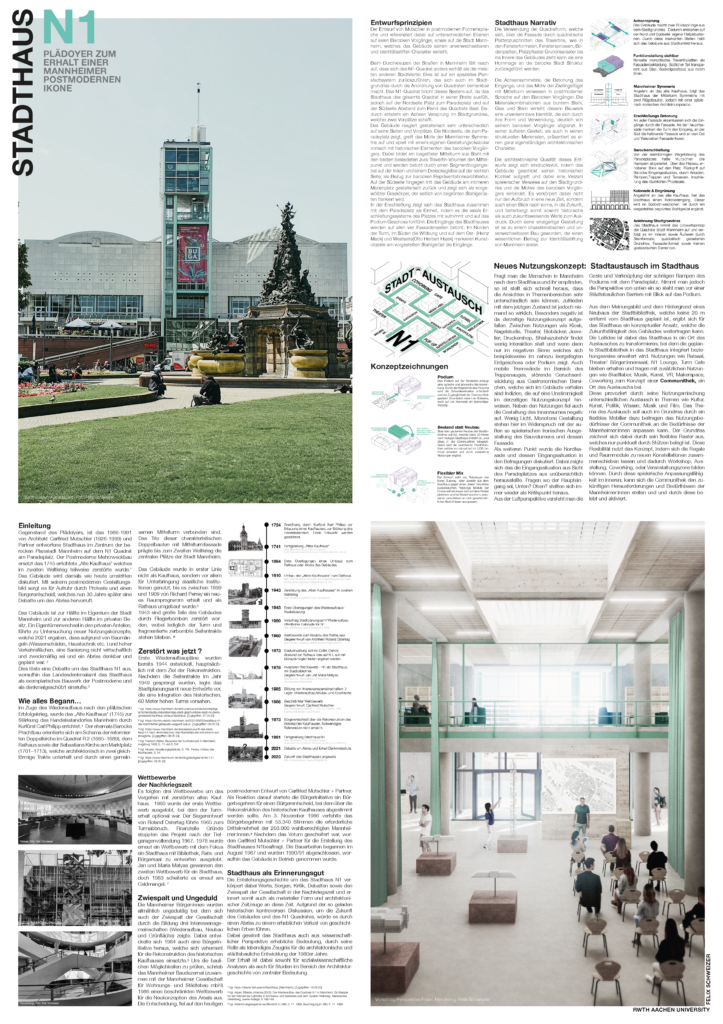
.on going.
The Transit-Chair for Urban Design and the Institute for Urban Design and European Urbanism consider complex urban structures – with a focus on designing and transforming as well as renewing cities and quarters, appropriate for the future, giving respect to their technical, ecological, economic and socio-cultural conditions, defined by region and space-become history.
Technical innovations, digitalization and globalization transform the worlds of living and working including the patterns and linkages of uses of the urban fabrics. Thus, urbanism carries the task, facing the relevance of space within these processes of transformation, to conceptualize, design and structure the utmost quality of the environment for the common welfare. In order to bundle relevant expertise at the Chair, the landscape of research of the Chair is specialized in five thematic groups:
– Campus Development
– Technical Innovation & Mobility
– Resources & Energy
– Structuring regional development
– Urban Design, Building Culture & Urban Monument Preservation

The purpose is the Heritage Impact Assessment (HIA) of the Master Plan for the Mosque-Cathedral of Cordoba, a planning and management document for this World Heritage property (WH) drafted in 2020.
The assessment will be carried out following the methodological guidelines published in 2022 by UNESCO, ICCROM, ICOMOS and IUCN under the title Guidance and Toolkit for Impact Assessments in a World Heritage Context. A methodology that responds to the sustainable management of these WH properties with a focus on participatory monitoring of the identified cultural values. A prerequisite for development projects and activities planned to take place in or around an WH property, which the World Heritage Committee includes in the ‘Operational Guidelines for the Implementation of the World Heritage Convention’ (24 September 2023). Specifically, in recommendation 118 bis agreed at the 43rd Congress held in 2019.
The ultimate aim is to guarantee the quality of a control process of the proposed actions on a property such as the Mosque-Cathedral, implementing monitoring mechanisms from the planning stage and facilitating the follow-up of the proposed actions.
Development of a conceptual framework that incorporates the contemporary cultural context into the theory of cultural value, methodological frameworks, normative frameworks and guidelines on the attribution of values to World Heritage properties and other heritage properties. Generation of the table of attributes and values, updating the current references and precedents, incorporating the perspectives of the previous action, the results of the participatory processes and the opinion of the international panel of experts. Table of attributes for the updating of cultural values in World Heritage properties. In this case, 48 maps have been produced to represent the scenario in which the medium-sized cities find themselves. Special interest is given to the summaries of the indicators which show an approximate idea of tourism in these cities.
The joint research project of the Karlsruhe Institute of Technology (KIT), RWTH Aachen University, and the GWZO Leipzig aims to develop new approaches for the sustainable management of cultural heritage in the post-Soviet space. Visit the project website here
UCCU is a member of the three-year research consortium Sustainability for Architectural Heritage (SAH). In collaboration with partners from UnivAq (Aquila, Italy), NTU (Athens, Greece), NUACA (Yerevan, Armenia), GSU (Goris, Armenia), UT (Tehran, Iran), and TIAU (Tabriz, Iran), the consortium works towards a comparative curriculum in the field of architectural and cultural heritage. More information on this ERASMUS+ funded project can be found here.
The working group, founded over 13 years ago by Prof. Christa Reicher, Head of the UNESCO Chair, brings together experts from research and practice. Each year, it hosts the Annual Conference on Urban Heritage Conservation, inviting the public to engage in discussions on heritage conservation issues at the urban design scale. Further information on the working group, its activities, publications, and upcoming events can be found here.
Heritage Impact Assessments are consolidated studies in the practice of World Heritage conservation. A working methodology has been developed which is applied, in this case, in the surroundings of the Alhambra, specifically on the northern slope, in the area of the Tajo de San Pedro and the Hotel Reúma. A work process that starts with the identification of values and ends with the evaluation of the impact and the extent of the effects of the proposed modification and which aims to ‘objectify’ the effects of the modification on the attributes and values of these assets. This project is linked to the department’s lines of research: -Landscape and environment -The construction of the heritage project from the integration of the different agents that intervene in it over time, at different scales and levels of complexity, territory, landscape, cultural assets, tourism and sustainability.
The fields of acting in teaching and research distil a variety of themes in the narrow interim space of the urban and bundle and densify issues from the width of the rural. Events (formats) for most different addressee groups and publications (products) transport the resulting interim products into performances of transfer to be communicated and mediated.
They make INPUT become sustainable OUTPUT and feed this in return and win-bringing into the urban and the rural space.
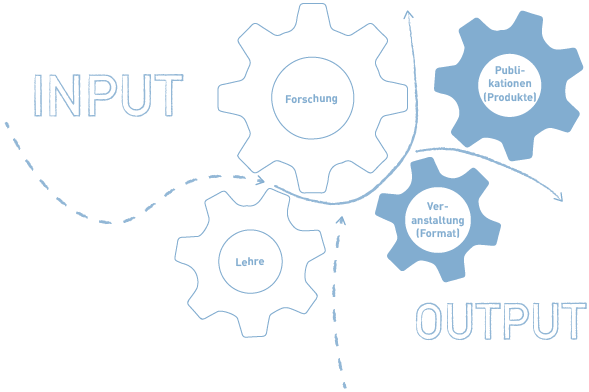
The UCCU had been in the past Initiator and participant as well as cooperating partner of most different formats – in the range of conferences and sequences of events via summer schools for students and PhD-candidates towards the curation of exhibitions.
Generated formats of transfer – and products may be approached to by applying the information below.
It has been presented the conference entitled: Challenges and challenges of heritage valuation of World Heritage properties from today’s perspective. The case of the Alhambra, the Alhambra Generalife and the Albaicín in Granada, Spain.
On March 21-22, 2024, RWTH Aachen University hosted an international conference organized by the CITIES.BUILDING.CULTURE Consortium. Alongside the Chair and Institute for Urban Design and European Urbanism at RWTH Aachen, the Consortium reunited researchers from the Karlsruhe Institute of Technology and the Leibniz Institute for European History and Culture (GWZO) in Leipzig. The event was the result of the collaborative three-year project supported by the German Ministry of Education and Research (BMBF), attempting to develop new approaches to the sustainable management of everyday built heritage in the post-Soviet space.
Bringing together over 80 participants including established researchers, practitioners, as well as master and doctoral students from various universities across Germany, the Netherlands, Ukraine, Italy, Austria, Hungary, Czechia, and beyond, the event transcended a mere presentation of project outcomes. Accompanied by an exhibition displayed in the Foyer of the Reiff Museum, the conference embraced interactive formats, opening a space for discussion and debate.
A notable highlight was a roundtable chaired by Prof. Florian Urban from the Glasgow School of Art, where participants, both researchers and practitioners, discussed the challenging future of large housing estates. Furthermore, a marketplace-style arrangement facilitated engaging discussions on an array of topics, ranging from methodologies in studying residential heritage to exploring the limits of heritage concepts and practices to practical considerations regarding the renovation of such heritage. Keynote addresses were delivered by Prof. Dr. Philipp Meuser from DOM Publishers and Dr. Semen Shyrochyn from Ukraine. Overall, the conference provided new insights and perspectives on the topic of residential heritage, while connecting research from Eastern Europe to broader international agendas.
The UNESCO Chair for Cultural Heritage and Urbanism is actively involved as a member of the three-year research consortium Sustainability for Architectural Heritage (SAH). In collaboration with partners from UnivAq (L’Aquila, Italy), NTU (Athens, Greece), NUACA (Yerevan, Armenia), GSU (Goris, Armenia), UT (Tehran, Iran), and TIAU (Tabriz, Iran), the initiative focuses on a comparative curriculum analysis in the field of architectural and cultural heritage.
The Erasmus+-funded project will conclude with a final conference at NUACA in Yerevan from December 11 to 14, 2023. The formal conclusion will feature presentations of curricular improvement proposals. Additionally, the identification of further synergies is planned to ensure the long-term continuation of collaboration within the consortium.
The conference will be accompanied by an exhibition showcasing student work developed through the existing cooperation. More information about the SAH network can be found here.
The UNESCO Chair for Cultural Heritage and Urbanism organized a discussion evening on the interconnection between resilience and cultural heritage. This event was part of a series of roundtable discussions held within the framework of the 18th Architecture Biennale in Venice, as part of the exhibition contribution “Climate Wunderkammer,” co-curated by Christa Reicher.
The evening focused on various approaches to integrated risk management for cultural heritage at both the European and national levels. Experts from the German Federal Ministry for Housing, Urban Development and Building, Delft University of Technology, the University of Liège, and other key stakeholders came together for the occasion.
For more details about Climate Wunderkammer, please visit the official Website.
The 13th Annual Conference of the specialist group “Urban Heritage Conservation” took place under the title “Identity & Common Good – The Built Environment as a Resource for Culture and Education” on October 26, 2023, at TH Köln. The event provided in-depth insights into current developments and challenges in the field of urban heritage conservation.
Founded over 13 years ago by Prof. Christa Reicher, Head of the UNESCO Chair for Cultural Heritage and Urbanism, the specialist group brings together experts from research and practice. Once a year, it hosts a public discussion on conservation issues at the urban scale.
Further information about the specialist group, its ongoing activities, publications, and upcoming events can be found here.
In collaboration with representatives from international universities such as GJU (Amman, Jordan) and GUtech (Muscat, Oman), as well as in cooperation with German institutions and urban development professionals, the UNESCO Chair for Cultural Heritage and Urbanism organized the “UNESCO Symposium International.”
The primary aim of the symposium was to provide an up-to-date overview of both practical and academic perspectives on interventions related to cultural heritage and their impact on urban change and necessary transformation processes. The symposium sought to identify fundamental concepts that enhance understanding while also addressing cross-cutting dimensions to better integrate cultural heritage aspects into urban and regional planning.
Additionally, the symposium facilitated the development of a shared vision for designing a more resilient curriculum in this field within an international framework.
More information about the event can be found here.
Under the title “Neighborhood Heritage: Urban Layers, Physical Environments, and Living Communities in the Post-Socialist/-Soviet City,” the UNESCO Chair for Cultural Heritage and Urbanism, in collaboration with ILIA State University (Tbilisi, Georgia), KIT (Karlsruhe), and GWZO (Leipzig), organized a doctoral school in Tbilisi as part of the research project cities.building.culture (cbc).
Sixteen students from diverse academic and cultural backgrounds were invited to explore differentiated approaches to neighborhood analysis and its layered heritage. Key topics included urban morphology, the construction and perception of values, civic engagement and urban governance, local memory and sense of place, and the significance and impact of processes such as revitalization, renovation, gentrification, and degradation. The program also examined mechanisms of heritage conservation, as well as the loss and destruction of heritage.
Guided by international expert lectures and discussion sessions with local specialists, the doctoral students worked in interdisciplinary groups, using visual research methods to analyze different neighbourhoods. At the end of the week, they presented their findings to the cbc team.
Further information about the doctoral school and the research project can be found here.
The Aachen-based UNESCO Chair for Cultural Heritage and Urbanism has taken the initiative to establish the “New Regional Bauhaus” (NRB) in the city centre of Heerlen, Netherlands, a neighbouring city in the tri-border region (DE, BE, NL).
With a focus on research, education, and public events, the NRB promotes a community-oriented and regionally adapted approach to addressing global challenges. The initiative emphasizes the importance of the regional scale in sustainability, integration, and design quality.
Regional stakeholders are warmly invited to engage in discussions and collaborative projects in this space.
More information and booking inquiries can be found here.
GeoRegioEMR is a teaching and learning tool on the geography of the Euregio Meuse-Rhine and is part of the EMRLingua project. It can be used in geography and neighbouring language lessons as well as in bilingual or interdisciplinary contexts.
The GeoRegioEMR invites learners and teachers from the Euregio Meuse-Rhine to explore their region and their immediate neighbourhood with curiosity and to get to know it (even) better – in keeping with the EU-regional idea.
We are pleased that we were able to contribute to the development of the platform with map materials.
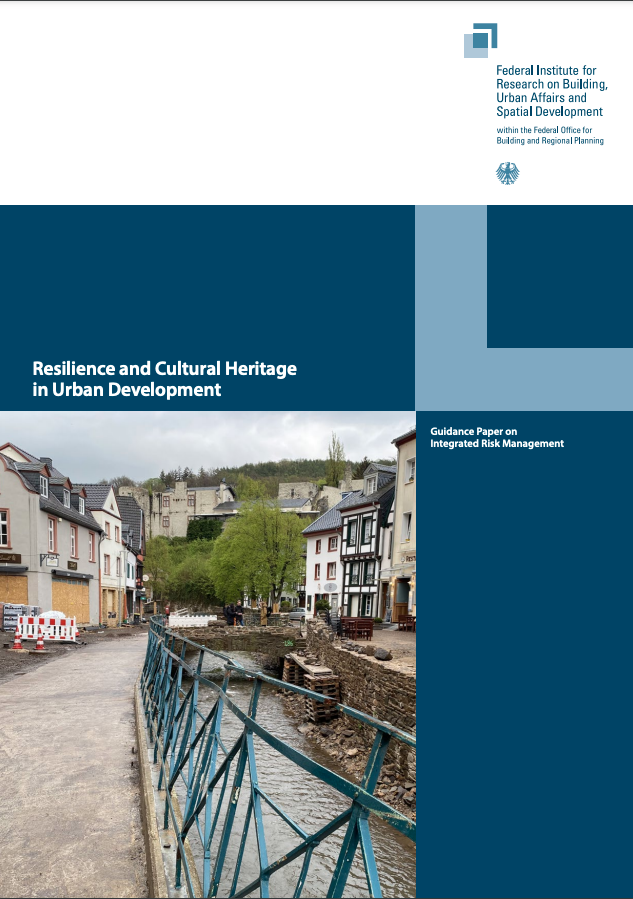
City centers are built – but more and more buildings within them stand empty. Many of these buildings shape the familiar cityscape or are even under heritage protection. Demolition and new construction cannot be the solution to accommodating new functions beyond retail. Often, it is precisely old buildings that create the atmosphere in which new ideas can take root.
For years, businesses in city centers have been struggling to survive. Vacant ground-floor spaces are spreading, and eventually, entire streets face the threat of neglect—regardless of the character or even the heritage value of the buildings. For too long, city centers have been equated with brick-and-mortar retail, and zoning plans with usage restrictions have been designed accordingly.
Now, there is growing recognition that the monotony of uniform retail areas has proven to be fragile in times of crisis. New ideas and concepts for mixed-use developments and enhanced public spaces in city centers are being discussed.
What role can architectural heritage play in this context as a source of identity, helping city centers regain their function as places of human interaction? If city centers are to preserve their character, existing structures must be repurposed.
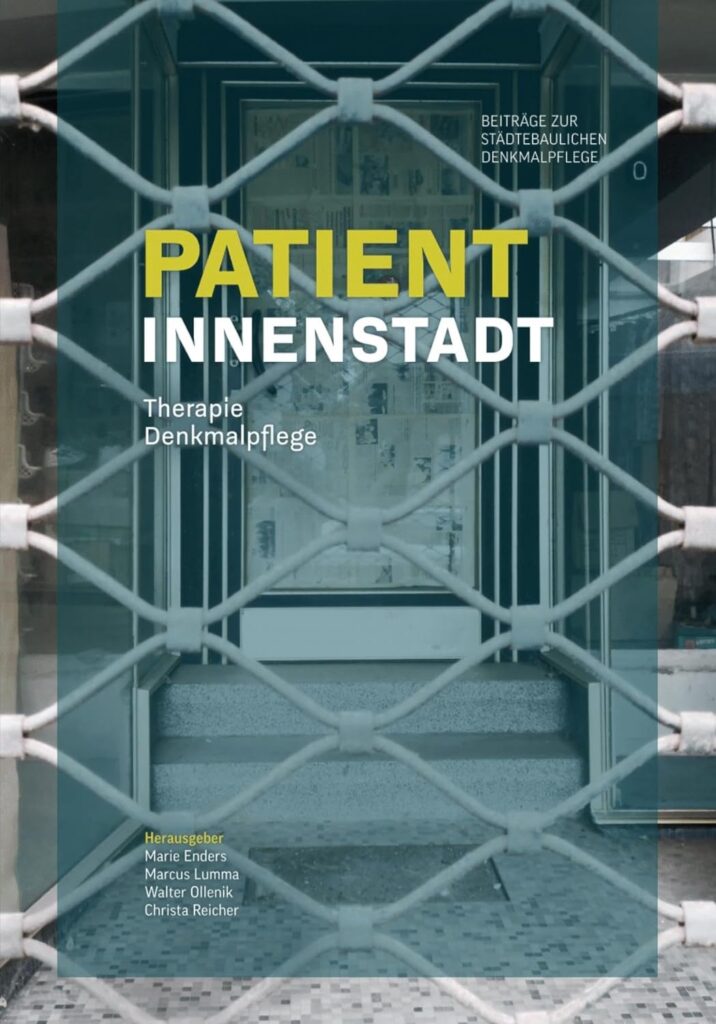
The book provides an overview of urban planning and the laws that regulate it, followed by a description of the city’s complex structure. It introduces various “building types” and the “layer method” in successive phases. Exemplary projects from urban development and competitions illustrate different design approaches. This new edition has been expanded to include chapters on informal urban planning and regional urban development.
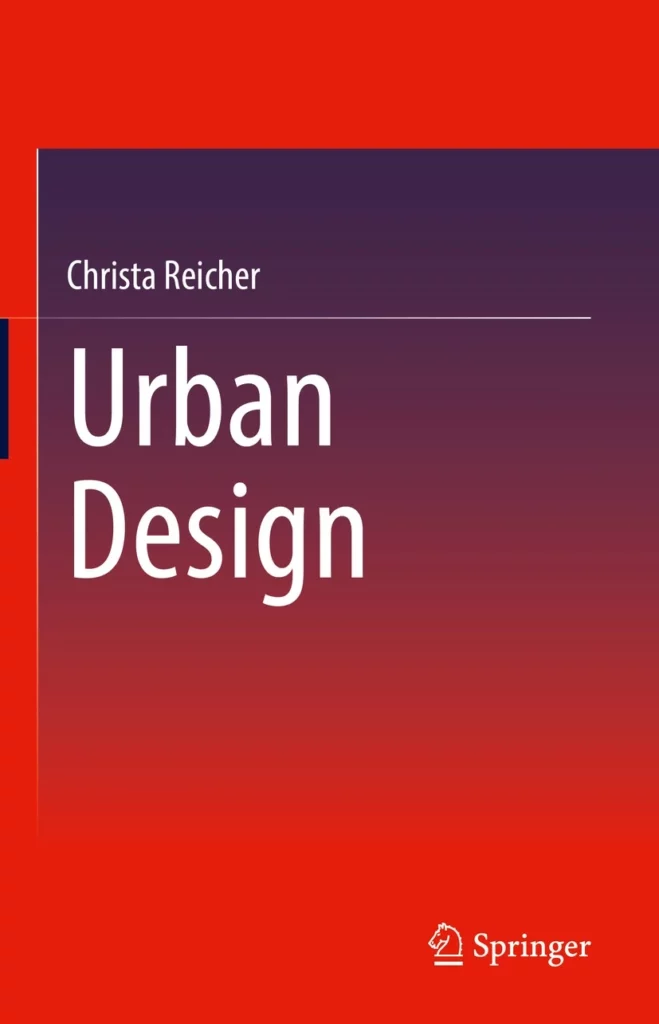
Phenomena such as globalization and digitalization are accelerating change and setting various aspects of life in motion. When used intelligently, these developments can create promising dynamics for local communities, their living environments, and the regional economy. This book brings together contributions from experts and students who participated in an international symposium at the UNESCO World Heritage Site Zollverein in Essen in 2018.
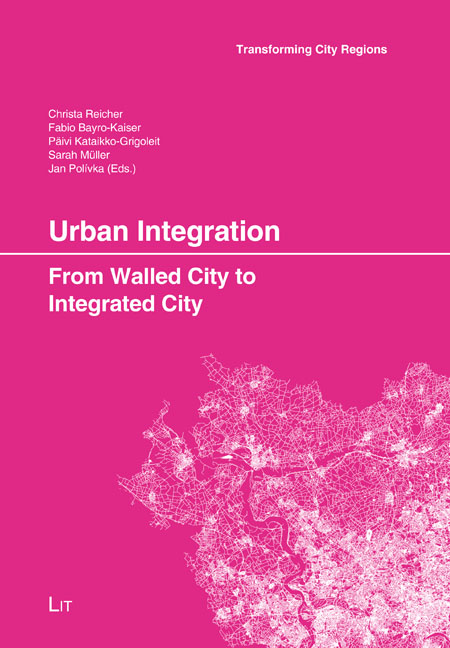
Through joint research and teaching activities, three key themes have emerged: urban transformation and public space, the social and cultural dimensions of cities, and nature-based planning approaches. This book presents contributions from participants on these topics, which were showcased at an international conference at GJU in Madaba, Jordan, in November 2017.
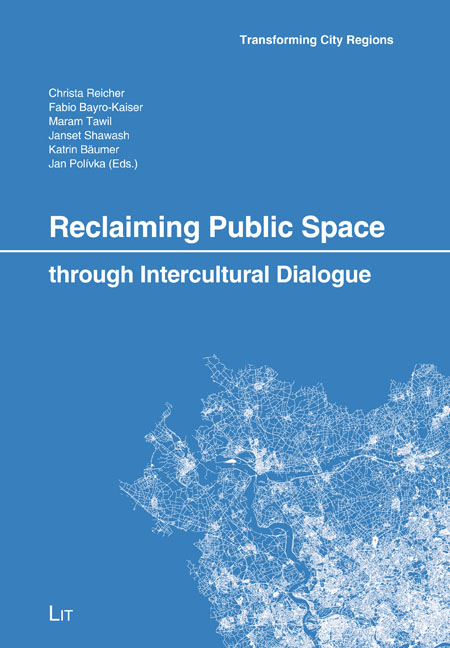
Information about future activities of the Chair and about on time applications for coming events will be provided here.
Transfer Space: New Regional Bauhaus
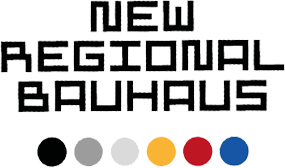
The Aachen UNESCO Chair for Cultural Heritage and Urbanism has initiated the „New Regional Bauhaus“(NRB) in inner urban areas of the Dutch neighbouring town Heerlen. Directly located in the three-countries corner (DE, BE, NL) the NRB directs its focus on a local consideration of common welfare and a regionally adapted approach to global challenges through activities in research, education and public events. The institution aims to emphasize on the regional scale in the fields of sustainability, integration and quality of structuring. Actors of the region are cordially invited to approach to their themes in this place.
